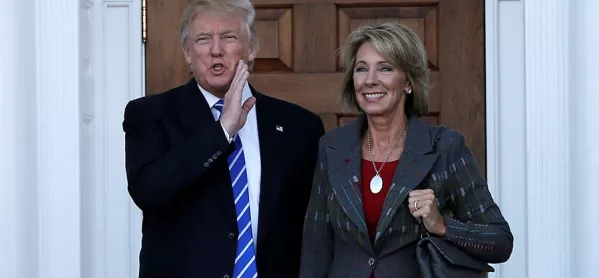This piece first appeared on Usable Knowledge, from the Harvard Graduate School of Education.
When President-elect Donald Trump tapped Betsy DeVos as his pick for US Secretary of Education, he triggered a debate over whether widespread school choice - like the voucher system that DeVos supports - would really boost student achievement across the country.
The selection has raised larger questions about who should finance education, how schools should be held accountable, and even how we define the value of a public school system. Educational economist Joshua Goodman is interested in exploring another question: whether increased competition would definitively improve the education market.
A former supporter of school choice, Goodman no longer backs the policy. We asked associate professor at the Harvard Kennedy School to share his thoughts.
Basic economic theory holds that competition improves markets. Why doesn’t this model apply to education?
I became an economist in part because of Milton Friedman’s argument that vouchers could improve schooling through market forces. At the time, this argument struck me as both revolutionary and obviously right. Competition improves supermarkets, restaurants - why shouldn’t this model apply to schools? It seemed to me that anyone who denied this idea didn’t understand basic economics.
But the more I read, the more I realized that the empirical evidence for choice and market forces improving educational outcomes is thin at best. I found that disappointing and also puzzling, and I have spent some time thinking about why that theory doesn’t match current reality.
Here’s what I think the biggest problem in thinking of schools as a classical market. Econ 101 models assume consumers observe product quality. But schools are complicated goods, and quality, particularly a school’s long-run quality, is hard to judge for many parents. It takes a lot of time to figure out whether this school and these teachers are serving my child well. Unlike restaurants or supermarkets, where quality can be judged at the moment of the purchase, school quality reveals itself later.
How else do schools complicate market theory?
Observing school quality is quite costly, and in many settings there is no credible way to inform future students about the quality of education they are getting. The for-profit college sector is a perfect example of this. Market forces fail to discipline for-profit colleges because for an individual student there’s no repeated game here. Students enroll and only much later realize lousy labor market outcomes. In particular, that students must enroll for a while to see long-run outcomes limits the power of the market to provide discipline. The time it takes to learn that a school is low quality damages the student, and that student’s information may not be transmissible to other students in a systematic or credible way.
So is there any potential role for school choice in improving education?
I think there is. Having been a public high school math teacher, I know that schools could use a bit of market pressure to counteract inertia. Local monopolies clearly allow many schools to coast on their current trajectories without trying new approaches or investing more effort. But I am much more skeptical now than I was before that market forces are some sort of panacea, as they appear to be in some industries. There will always be a need for public accountability, if only to lower information costs to parents and students.
How does this play into reaction to Betsy DeVos as a future Secretary of Education?
It is DeVos’ opposition to accountability that concerns me, as it suggests a misunderstanding of what makes competitive markets actually work. This is the danger of teaching the Econ 101 model without caveats. Most people never take the next econ class. I hope that the Department of Education will strike the right balance on choice and accountability going forward.
Want to keep up with the latest education news and opinion? Follow TES USA on Twitter and like TES USA on Facebook.




